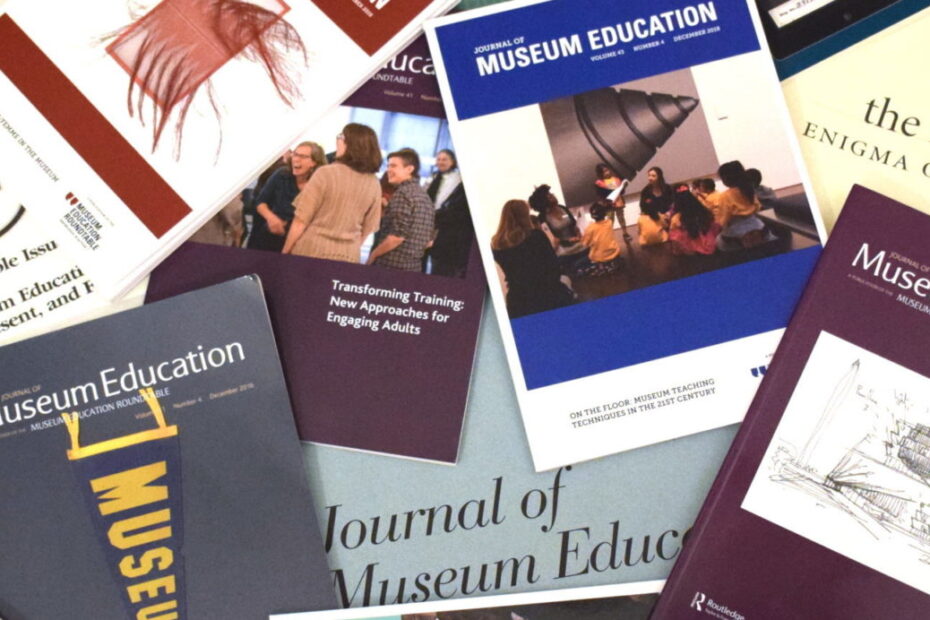Journal of Museum Education
Vol. 47 No. 2 June 2022
CALL FOR ARTICLE IDEAS
The Call for Disability Justice in Museum Education: Re-Framing Accessibility as Anti-Ableism
Guest Editors: Syrus Marcus Ware, Kate Zankowicz, Sam Theriault, Sarah Sims
The Journal of Museum Education (JME) invites submissions for the June 2022 issue to share how the museum educator sector is defining and developing an anti-ableist museum education practice. It seeks to establish new standards for Mad and disability justice in museum accessibility and inclusion by documenting and amplifying work that advances new practices in the field and centers the perspectives of Mad people and people with disabilities. At its core, this issue asks how we can work to create an anti-ableist museum education practice and what such work looks or feels like. We recognize that disabled identities are vast, varied and multi-layered and use many words beyond ‘disabled’, and exceed what we can list here. For simplicity, we are using disability in a broad sense.
Articles could address the following questions and topics:
- How can we define and enact anti-ableism as going beyond the accommodations for museum audiences?
- How can educators support structural changes that are crucial to advancing Mad and disability justice in museum communities and for museum staff?
- How can we center the perspectives of people who identify as Mad and/or disabled in museum education program development (“nothing about us, without us.”)?
- What does it mean to be an educator within an institutionally ableist museum?
- How do museums, as places where systemic oppressions intertwine (e.g. race, gender, class, disability), continue to uphold ableist notions of access, participation and belonging?
- How do current accessibility programs in museum education contribute to ableism, and how can we dismantle those practices?
- While the JME is dedicated to the field of museum education we recognize the important overlap and collaboration between museum educators and other museum practitioners. We therefore welcome article proposals that address accessibility in museum hiring, exhibits, and other departments. Article proposals of an inter-departmental nature will need to demonstrate a clear connection to and knowledge of museum education.
- In addition, we welcome article proposals that review the history of museum accessibility.
Submission Process and Criteria
We welcome submissions from authors around the world who currently or formerly work in or with museums. We will prioritize submissions that:
- Balance a clear and well supported argument with practical take-a-ways that readers/practitioners can act on that advances and improves upon current practices in museum accessibility and Mad and disability justice in museums
- Are rooted in anti-ableism and center the perspectives of Mad people and/or people with disabilities
- Have a clear connection to museum education
- Use plain language and jargon-free language
As a whole issue, we aim to ensure the articles represent a variety of museum types, sizes and locations, and that authors with disabilities and Mad authors are prioritized.
To be considered for the issue, potential authors must complete this brief online form with author contact information, a clear thesis and an abstract for your proposed article, and answers to the following questions 1.) how your article and the work it outlines advances museum disability justice and anti-ableist practices 2.) how your article and the work it outlines is rooted in anti-ableism and centers the voices and perspectives of Mad people and people with disabilities, and 3.) how your article and the work it outlines specifically relates to museum education.
Article ideas must be submitted via the online form by May 31, 2021.
The guest editors will review submissions with the support of the MER Editorial Team and contact potential authors to discuss their proposed article ideas.
Once an article idea is accepted, authors must submit a maximum of 4,500 word paper and short bio to the guest editors on or before October 15, 2021. All submissions that are accepted by the guest editors will then undergo the standard peer review process, in which authors will not know who reviewed their work and reviewers will not know who authored the submission. Reviewers recommend publication, revision, or rejection of a submission.
While articles published in the Journal of Museum Education must be original scholarly work, with a thesis, abstract, and citations, we are committed to supporting the use of plain, jargon-free language. Articles that include personal reflection, interviews, or that take on a more conversational tone are encouraged, as well as more traditional academic writing.
Visit our Journal Submissions page for more information or feel free to contact the editors at access@museumedu.org with questions.
As an organization based in the United States, MER is committed to the principles of the Americans with Disabilities Act (ADA). In addition, with international authors and readers, we strive to make the Journal of Museum Education as accessible as possible and will provide accommodations. For specific accommodations at any point during the submission or writing process, please contact: access@museumedu.org.
The Journal of Museum Education (JME) is the premier peer-reviewed publication exploring and reporting on theory, training, and practice in the museum education field. Journal articles—written by museum education practitioners and scholars—explore such relevant topics as museum-related learning theory; visitor engagement and community involvement; evaluation; teaching strategies for art, science, and history museums; and the responsibilities of museums as public institutions.
